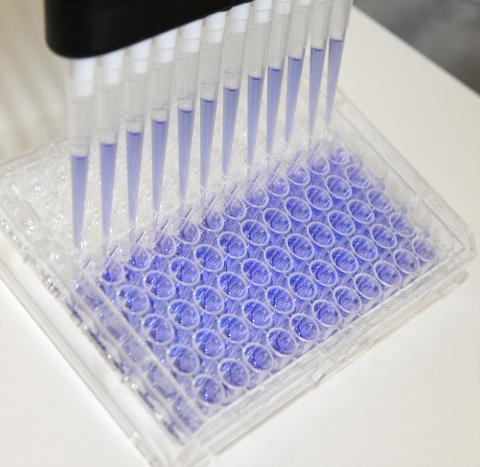The idea
This project led by Professor James Brenton and Dr Martin Miller explored how chemotherapy may unexpectedly activate immune cells in ovarian cancer tumours. They wanted to look at why this positive immune cell response might happen in some but not all patients after chemotherapy treatment.
This research could revolutionise how we treat ovarian cancer in the future. Previous research by Dr Miller showed that the immune system may play an important role in slowing the growth of metastatic ovarian cancer, which is ovarian cancer that has spread to other parts of the body. In some women, specific types of white blood cells are found in or near some tumours, and the team found that these women are more likely to survive for longer.
However, in primary ovarian cancer, which has not spread beyond the ovaries, less is known about the immune systems response. The team are addressing this lack of knowledge so they can better understand the interplay between immune cells, cancer cells, and chemotherapy. Once they understand more, they can begin to look at optimising ovarian cancer treatment.
Project background
This project was started by Dr Martin Miller and was subsequently led by Professor James Brenton. Researchers are based at the Cancer Research UK Cambridge Institute.
The key idea of the project was to understand more about what happens in and around high-grade serous ovarian cancer (HGSOC) tumours. This space is called the tumour microenvironment (TME). Tumour microenvironments are very complex being filled with different types of cells and poorly understood. Tumour microenvironments may explain why some tumours respond well to chemotherapy and some don’t. Ultimately knowledge of the TME may help researchers to find new drug targets.
Project plan
The objectives of this research project were to:
-
Discover how chemotherapy affects immune cells in ovarian cancer,
-
Understand why there is a favourable immune cell response in some but not all patients after chemotherapy treatment,
-
Unlock the power of the patient’s own immune system to help eradicate cancer cells for example by proposing new combination therapies with chemotherapy and immunotherapy.
Research results
Three major developments in this project take forward our understanding of ovarian cancer. The team developed a new computational tool to analyse the tumour microenvironment. They used the tool to understand the tumour microenvironment and to uncover the potential for chemotherapy to increase the level of helpful immune cells in and around tumours of people with HGSOC. This project also increased our understanding of how natural killer cells recognise and kill tumour cells.
Why is this research important to those affected by ovarian cancer?
This project has increased understanding of the tumour microenvironment and shown that the immune response in ovarian cancer is very complex compared to other cancer types where immunotherapy has proved helpful. Understanding more about how natural killer cells work may eventually lead to researchers being able to develop new treatments. This project has led to other projects at the CRUK Cambridge Institute which will continue to add to our understanding.
Fact file
Researcher: Professor James Brenton (formerly Dr Martin Miller)
Institution: Cancer Research UK Cambridge Institute
Project dates: June 2019 to May 2022
Funding awarded: £199,546
Project status: complete
Key publications:
Jiménez-Sánchez A, Cast O, Miller M. Comprehensive benchmarking and integration of tumor microenvironment cell estimation methods, Cancer Res 2019;79:6238–46, DOI: https://doi.org/10.1158/0008-5472.CAN-18-3560
Jiménez-Sánchez A, Cybulska P, Mager KL, Koplev S, Cast O, Couturier DL, et al. Unraveling tumor–immune heterogeneity in advanced ovarian cancer uncovers immunogenic effect of chemotherapy. Nature Genetics 52, 582–593 (2020). https://doi.org/10.1038/s41588-020-0630-5




